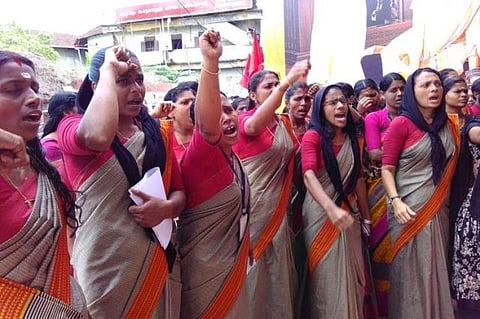

Every time you walk into a textile shop, they welcome you with a smile and tempt you to buy from the collection on display. But behind that smile could be a person who hasn’t had a minute to sit down in hours or hasn’t even been allowed to go to the bathroom.
In December 2013, five female salespersons at Kalyan Sarees in Thrissur had gone on strike demanding better working conditions. It was only after three months that the management acceded to all their demands and revoked their suspension.
Their demands were simple: the right to take toilet breaks, the right to sit and the guarantee that they are paid wages as per the 2009 Minimum Wages Notification Act, which amounted to Rs 7,415 per month.
(Image courtesy - Azhimukham.com)
In spite of this strike getting much attention, nothing much seems to have changed.
“A few things changed after the strike, but now we are back to the old situation. I reach home around 11 pm and by then my knees are aching severely. They continue to cut our salaries for small and silly reasons as a way to reprimand us,” says Fahima (name changed) who works in a store in Ernakulam.
Anima Muyarath – a lawyer and currently a Project Fellow at the Tata Institute of Social Sciences (TISS) in Mumbai – has been studying how human rights of women workers in the textile retail sector are being violated in Kerala.
Based on her complaint, the National Human Rights Commission (NHRC) on July 1, 2016 issued a notice to the Government of Kerala through its Chief Secretary to the Department of Labour and the Labour Commissioner over the pathetic working conditions of female employees at textile retail shops in the state.
Speaking to The News Minute, Anima says that it is indeed a disheartening scene for the female workers who are not allowed to sit or go to the toilet during the course of their working day, which extends to more than ten hours daily.
According to the complaint filed with the NHRC, many textile shops in Kerala do not even have toilets in place for their employees. And even when these are catered for, permission is required from the manager for its use during working hours.
“We work for 12 hours a day and are allowed to sit only during lunch break, that too never more than fifteen minutes. Floor managers will keep a tab of how many times we go to the restroom and during rush-hour we are simply not allowed to go to the bathroom. Most of us suffer from knee pain. I can tolerate everything, but please allow us to sit,” says Shailaja (name changed), who works in a textile shop in Kochi.
Most of the salespersons work for as less as Rs 3,000 to Rs 4,000 in a job that takes a massive toll on their health. Most suffer from conditions such as aggravated varicose veins at a very young age.
In 2014, the Kerala government did pass an ordinance amending the Kerala Shops and Commercial Establishment Act of 1960 but forgot to extend its scope to protect the interests of workers in the unorganized labour sector.
Anima alleges that the management at Kalyan Sarees continues to harass the five protestors by delegating them to work in the textile depot rather than as salesgirls in the showroom, making them wear a different set of uniform from their counterparts at the shop and not letting them come in contact with their colleagues.
The latest attempt to sort out this issue was at a sitting with the Labour Commission in the last week of June this year, but -not surprisingly- this got postponed to the 18th of this month. “Imagine, it’s been two years and this has been the usual procedure. The management is yet to play a square deal,” she adds.
Citing another example of the agitation led by more than 60 workers of Seema Textiles at Alappuzha in August 2015 – that was supported by the leftist CITU – Anima says that while the management did finally give in to the workers’ demands, they continue to make deductions from the monthly wages, citing a sudden decrease in the Stock Market Index.
“This just goes to show to what ridiculous levels these guys can go to, just to avoid providing the basic amenities due to any human worker. Does this not constitute blatant violation of human rights?” she rues.
Responding to what prompted her to file the complaint in the first place, Anima explains: “This was done as part of my project work at TISS. But even before that, I have been working closely with the AMTU on several issues dealing with the female workers of the state.”
AMTU stands for Asanghaditha Meghala Thozhilali Union which is the first all-women trade union that focuses on workers in the unorganized sector in Kerala. It has its headquarters in Kozhikode.
It was Anima who was instrumental in getting the AMTU officially registered in January 2016. It had its earlier avatar in ‘Pennukoottu’ formed in 2010.
It came into being when a group of women working as cleaners, sweepers and saleswomen at Mittai Theruvu or Sweetmeats Street at Kozhikode joined forces to protest against the lack of bathrooms for women working there